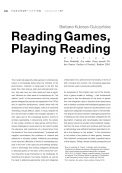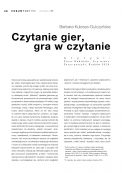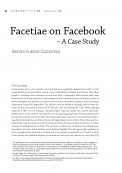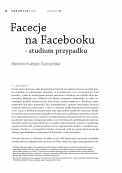Has been a graduate of and PhD candidate in the Department of Modern Literature and Culture at the Faculty of Polish and Classical Philology of Adam Mickiewicz University since 2013. She previously completed an independent program in Interdisciplinary Humanities Studies. Her main research interests include internet literature (particularly fan fiction), problems relating to interpenetration of old and new media, popular culture, and the activities and functioning mechanisms of fan communities. Her most important publications have included: “Zagadnienie autorstwa w utworach fan fiction. Fandom jako kolektyw twórczy” (The Problem of Authorship in Works of Fan Fiction. Fandom as a Creative Collective), in: Re-miks. Teorie i praktyki (Remix. Theories and Practices), ed. M. Gulik, P. Kaucz, L. Onak, Kraków 2011; “Znaczenie Internetu w rozwoju fan fiction, czyli twórczość fanowska i nowe media” (The Importance of the Internet in the Development of Fan Fiction, or Fan Fiction and New Media), in: Media – kultura popularna – polityka. Wzajemne oddziaływania i nowe zjawiska (Media, Popular Culture, and Politics. Mutual Interaction and New Phenomena), ed. J. Bierówka, Kraków 2014; and “Czym się różni autor od aŁtora, czyli fanowskie gry z autorstwem” (How is the Author Different from the AWthor, or Fan Games with Authorship), Tekstualia 2015, no. 2.
Od 2013 roku doktorantka w Zakładzie Literatury i Kultury Nowoczesnej na Wydziale Filologii Polskiej i Klasycznej UAM. Absolwentka Międzykierunkowych Indywidualnych Studiów Humanistycznych. Do jej głównych zainteresowań badawczych należą: literatura internetu (szczególnie twórczość fanowska), zjawiska związane z przenikaniem się starych i nowych mediów, kultura popularna oraz działania i funkcjonowanie wspólnot fanowskich. Opublikowała wiele artykułów, m.in.: Zagadnienie autorstwa w utworach fan fiction. Fandom jako kolektyw twórczy, w: Re-miks. Teorie i praktyki, red. M. Gulik, P. Kaucz, L. Onak, Kraków 2011; Znaczenie Internetu w rozwoju fan fiction, czyli twórczość fanowska i nowe media, w: Media – kultura popularna – polityka. Wzajemne oddziaływania i nowe zjawiska, red. J. Bierówka, Kraków 2014 oraz Czym się różni autor od aŁtora, czyli fanowskie gry z autorstwem, „Tekstualia” 2015, nr 2.

The crucial role played by video games in contemporary culture is increasingly being noted by scholars of the phenomenon. Attention is being paid to the fact that aside from their obvious ludic and entertainment function, they also carry out other tasks and have a significant influence on other areas of contemporary art. (...)

Kluczowa funkcja, jaką pełnią we współczesnej kulturze gry wideo, dostrzegana jest coraz częściej przez badaczy zjawiska. Zwraca się uwagę na fakt, że poza oczywistą funkcją ludyczną i rozrywkową, realizują one także inne zadania i mają istotny wpływ na pozostałe dziedziny dzisiejszej sztuki. (...)

On Facetiae
Social media such as the popular site Facebook were originally designed primarily to help people find their friends online, stay in contact with them, and make new friends. They allow people to exchange short messages in real time with a community that includes both close friends and casual acquaintances, concerning events of a private (or even intimate) nature, as well as thoughts and opinions on current events in the sociopolitical sphere, and to exchange interesting content via hyperlinks. (...)

O „facecjach”
Portale społecznościowe, takie jak popularny Facebook, początkowo przeznaczone były przede wszystkim do odszukiwania znajomych za pośrednictwem sieci, utrzymywania z nimi kontaktu, a także do nawiązywania nowych znajomości. (...)









